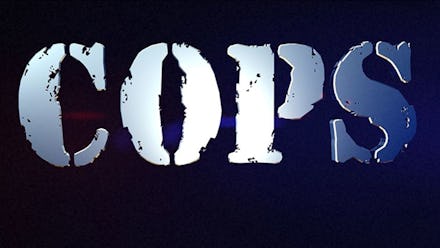Good riddance to 'Cops,' a bad show through and through

For 33 seasons, the television series Cops made light fare of the American carceral condition. Its theme song, “Bad Boys,” by the reggae group Inner Circle, became synonymous with the tired dichotomy of good guys versus bad guys — nevermind the song’s more complex meaning. Cops belongs to a legacy of American television that successfully flattened the complexity of the criminal justice system, and informed a generation’s worth of misinformed ideas about police brutality. Earlier this week, The Paramount Network cancelled the series in the wake of nationwide unrest over persistent racial injustice in policing.
That it took this long for our culture to take a significant and hard look at the message that shows like Cops perpetuate makes any idea of progress in its cancellation hard to take seriously. We’ve known that our images of police in pop culture, from crime procedurals to one-sided reality series, help furnish a view of police misconduct that skews in favor of the police. We’ve known that this series helped advance stereotypes about Black people as criminals. We’ve known that white supremacists lurk inside of police departments at alarming numbers.
But Cops’ cancellation is indeed part of a broader reckoning that may well bring about much-needed change. Following an incident in which a police-involved killing was captured on camera, the A&E series Live PD was canceled. As the nation reeled over the death of George Floyd, actors from popular crime procedurals took to social media to speak out about the role those series have played in our view of policing. Even the children’s series Paw Patrol saw its fair share of scrutiny, as attitudes towards American policing took a turn towards the radical.
The scholar Joshua Gamson’s 1998 book Freaks Talk Back, made the case that the increased visibility of marginalized groups on the generations’ nascent crop of tabloid-style reality shows made it possible for these groups to have a voice on mainstream television. But where shows like Jerry Springer and Maury take some effort at humanizing the taboo subjects present, Cops never managed to be more than one-dimensional. Here’s a bad guy — who is probably not white — and here are some cops chasing them, and maybe roughing them up a bit. It’s hard to overstate how several decades of that type of normalization will be hard to unravel.
But as with the many reckonings that have come in the past weeks, it feels as though Pandora’s box may finally be open. It was obvious that a show like Cops only served as something of a propaganda arm for the nation’s police departments. A meticulously detailed podcast about the show takes great pains at making that perfectly clear. And yet, as with the current tumult over Nascar banning an obviously offensive symbol from future races, the entrenched values of so many Americans are unshakable in the face of real evidence. For now, it’s good riddance to Cops. Here’s to hoping they get rid of Fox News next.